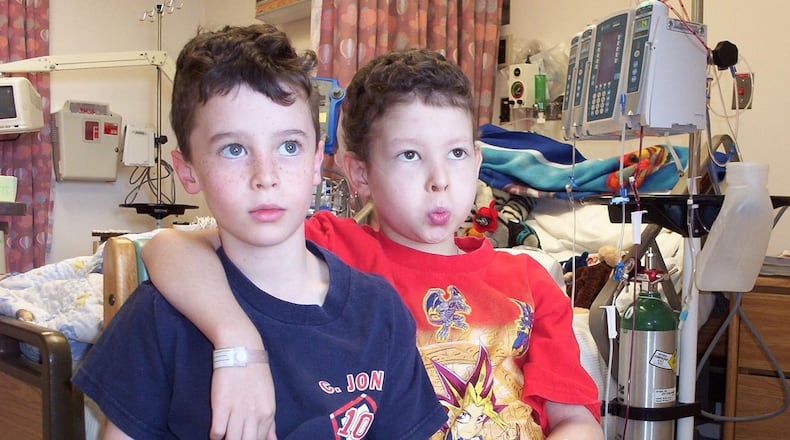Killian Owen was a happy child who loved going to school, splashing in puddles and playing sports of any kind.
“Mr. Mischief. Mr. Life of the Party,” said Killian’s mom Grainne Owen.
Even after Killian was diagnosed with leukemia at age 5 and underwent grueling treatment, the green-eyed blond was determined to keep swimming with his Marietta neighborhood swim team.
Killian died from leukemia in the summer of 2003. He was 9 years old.
Credit: Contributed
Credit: Contributed
As the painful first anniversary of Killian’s death approached, Owen prepared to console her three other children, including Killian’s twin brother, when she had an epiphany. It would lead her and her husband Clay to begin their own nonprofit in Atlanta in 2005 — Curing Kids Cancer.
The Owens’ organization became so successful, they recently awarded Winship Cancer Institute of Emory University $1.3 million for an endowed professorship to help fund cutting-edge pediatric cancer research.
It’s a significant donation but only the latest major gift by Curing Kids Cancer, which has raised $28 million to fund new childhood cancer treatments and pediatric cancer research at more than 45 pediatric cancer institutions.
Credit: Contributed
Credit: Contributed
In the summer of 2004, Owen told her children that God was looking after their brother, Killian, who was a “very special guardian angel up there now.”
“I suddenly realized I needed to stop being angry and depressed and sad and do something positive because Killian was one of the most positive children I had ever met,” said Owen.
She remembered a coach of one of Killian’s brothers at a church basketball league in Marietta. The coach was so moved by Killian’s fight that he asked the team to skip the customary end-of-season gift and instead make a donation to Children’s Healthcare where Killian had been treated.
Pulling inspiration from that first coach’s generosity, the initial format for fundraising was established: Instead of giving gifts to coaches at the end of a season, teams could donate money to Curing Kids Cancer in their coaches’ honor.
Credit: custom
Credit: custom
The organization has since expanded its fundraising to include several sources of donations including Mecum Auctions, a leader in live auctions of collector and classic cars and golf tournaments. The Owens moved to Dallas, Texas about six years ago but the charity maintains an office in Atlanta.
At the time of Killian’s diagnosis, a potential treatment was being developed but was not yet ready as an option for him.
“I had this absolute conviction that I was supposed to raise money so that drugs like this one could be given to other children and save their lives, even if it was too late for Killian,” said Owen.
At Winship, Dr. Kelly Goldsmith has been named the first Curing Kids Cancer Professor of Pediatric Oncology.
Goldsmith, co-lead of the Discovery and Developmental Therapeutics Research Program at the Winship Cancer Institute, focuses her research on investigating treatments for chemotherapy resistance in pediatric neuroblastoma, a rare cancer affecting mostly children 5 and younger.
Neuroblastoma is an aggressive solid tumor that begins in nerve tissue and usually arises near the adrenal glands. It is the most common solid cancer in children younger than 1. In the U.S., about 600 children are diagnosed with neuroblastoma each year.
Despite aggressive chemotherapy, radiation, and immunotherapy, nearly half of patients with a neuroblastoma tumor that has spread to other parts of their body will die from the cancer.
Goldsmith’s research includes investigating immunotherapy and precision medicine approaches to targeting neuroblastoma cells more specifically than standard chemotherapy drugs.
Curing Kids Cancer’s very first award of $100,000 helped get a new therapy for leukemia that was not yet ready for Killian to move forward into a clinical trial. Researchers have built on those advances to make major strides in treating pediatric leukemia. Today, children with leukemia have up to a 90% survival rate, according to Yale Medicine.
“On behalf of Killian, they (the Owens) are an incredible driving force in spearheading research and supporting research for pediatric cancers,” said Goldsmith. “They are dedicated to eradicating childhood cancer through really funding innovative research and by focusing on pediatric cancer they are contributing significantly to improving treatments and outcomes and ultimately the lives of children facing this devastating disease.”
About the Author
Keep Reading
The Latest
Featured







